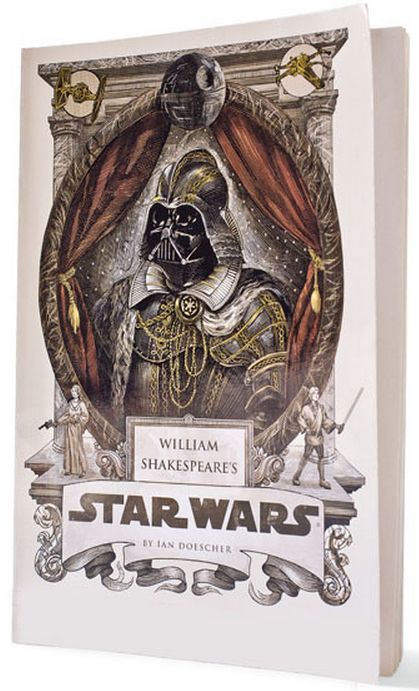Bookworms: Shakespeare’s Star Wars (2013) by Ian Doescher
“O Luke, Luke! wherefore art thou Luke?
Deny thy father and refuse thy name;
Or, if thou wilt not, be but sworn my love,
And I’ll no longer be a Skywalker.” – from Romeo and Juliet (kinda)
My first introduction to Shakespeare was not in school or the library. It was out of the mouth of warriors and chancellors, traitors and captains. Star Trek VI: The Undiscovered Country is, in many ways, an homage to the great political epics penned by William Shakespeare. Shakespeare is perhaps the greatest English language writer, though Chancellor Gorkon of the Klingon Empire would have you believe that one has not truly read Shakespeare unless it “be in the original Klingon”. While on trial for the assassination of the Chancellor, General Chang inquires of Captain Kirk: “What would your favorite author say now, Kirk? ‘Let us sit upon the ground and tell sad stories of the death of kings’?” After the release of the Star Trek film, various Klingon language experts translated Hamlet into Klingon*. Some years later, Much Ado About Nothing was translated. To my knowledge this was the first true and total intersection of a science fictional universe and Shakespeare until this year.
Earlier in the year, Ian Doescher, a self-proclaimed lover of the Bard, re-wrote the first Star Wars film in iambic pentameter and in the style of Shakespeare’s popular plays. The result is William Shakespeare’s Star Wars. Starting with a chorus presenting the opening crawl, and the entrance of the two main characters, R2-D2, and C-3P0, the story of Star Wars is off with asides, soliloquies, and even a song (Princess Leia sings a lament for Alderaan). R2 speaks in pentameter beeps and squeaks except when he is speaking in an aside about his crucial mission to Obi-Wan and the Death Star plans he carries. Darth Vader struggles with his place in the universe as a harbinger of death, Han Solo is conflicted as to whether he must play the rogue or hero, and Luke Skywalker endures the transition from humble farmboy to galactic warrior.
Aside from a childhood flirtation with Shakespeare and Star Trek, I really didn’t understand or appreciate the former until I got to college and studied under a few Shakespeare experts. My professors took the time to explain the archaic language, the staging, the peculiar puns and references, and the entire world that Shakespeare inhabited. As a result, his plays came alive for me. I could see them happening on a dim stage in the Globe theater in my mind as I read. A similar transformation happened for me when I started reading Shakespeare’s Star Wars. I know the story of Star Wars by heart. It is probably the movie I have watched most in my life. But by reading the iambs and the rhymes and watching it unfold on a stage as told through the Elizabethan language, I experienced Star Wars like I never thought I would: for the first time all over again. I laughed, I cried (no, really), I was emotionally moved.
Doescher does a remarkable job in transfusing a galactic tale and a centuries old playwright into something that simultaneously transcends and honors both source materials. Such a feat is extremely difficult to achieve, and the simplicity of the text deceives the inattentive reader. Many passages are familiar to even a casual student of Shakespeare, but Doescher did not do as I did in my epigram, merely replace words and imitate a metric. He rewrote classic Shakespearian passages to fit the Star Wars story. Familiar phrases and themes echo with new dimension and fresh perspective. The genius of George Lucas’ original Star Wars story is that he as closely as possible retold the hero’s journey, the classic storyline of the monomyth. Darth Vader is the evil villain, Luke the naive hero, C-3P0 the comic relief, Obi-Wan the wise mentor, and so on. Because Star Wars is so basic and so profound at the same time, it perfectly yields itself to be intertwined with the engaging structure that is a Shakespeare play.
William Shakespeare’s Star Wars is divided into acts, and is accompanied by incredible artwork. Vader, Luke, and even the droids are rendered visually into an Elizabethan style, perhaps as they would have appeared had Shakespeare’s costuming director designed them for the Globe Theater.
For me, this little volume will become a well worn book. I delighted in reading passages out loud to my wife, and I was immersed in pure joy as I read. The fun and the adventure of the film leaps off the page, and the depth and wit of Shakespeare gives it wings to soar.
If you enjoy Star Wars, even a little, then you owe it to yourself to grab a copy of this book. If you never quite “got” Shakespeare or understood his plays, this is the Shakespeare for you, and after reading, you just might find yourself itching to pick up Hamlet for another try.
I cannot more highly recommend this play, and I cannot more highly commend Doesher for his work. I very, very much hope that The Bard Strikes Back and Return of the Playwright are in the works.
*For more on Klingon, go here. Follow Ian Doescher on Twitter @iandoescher.
